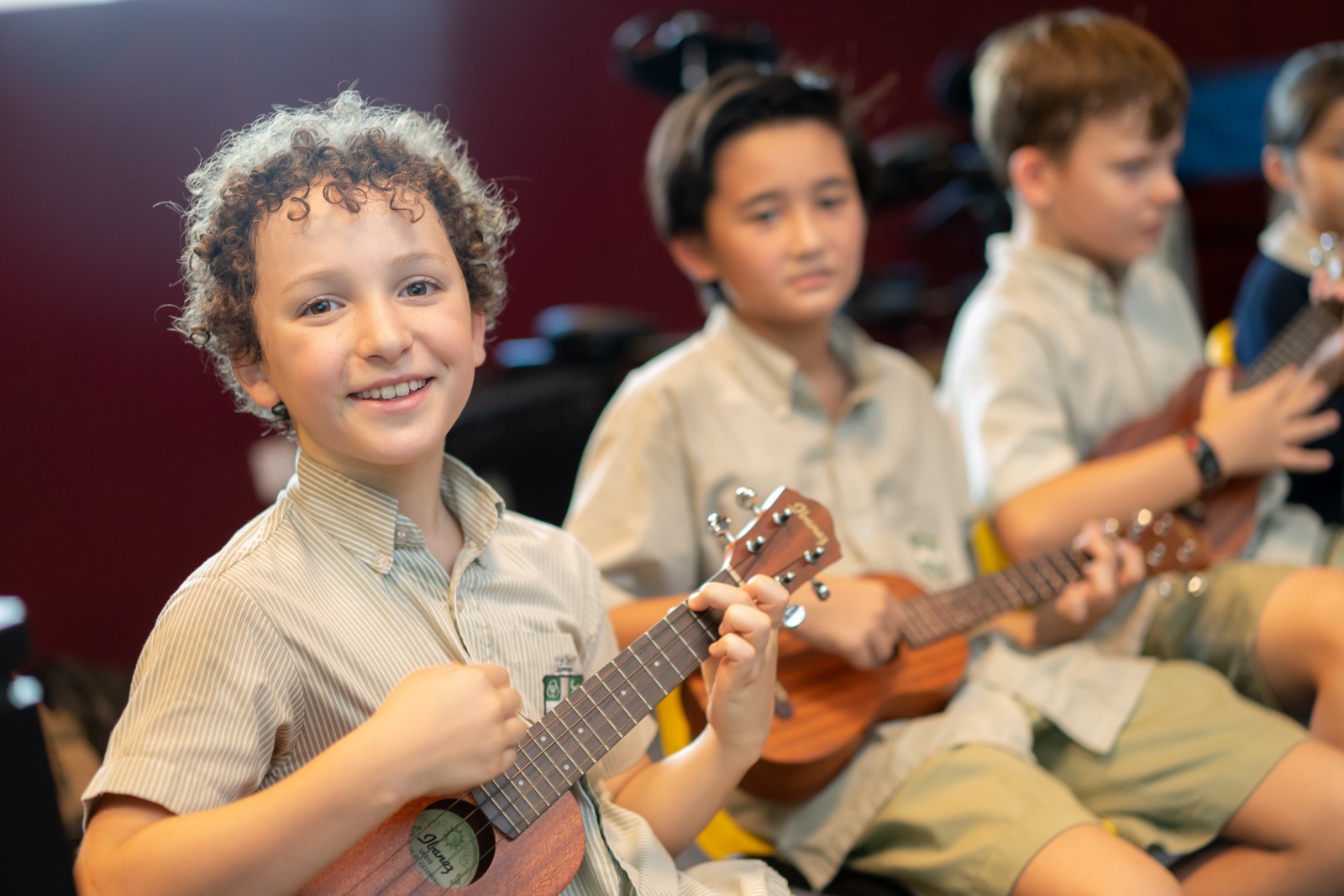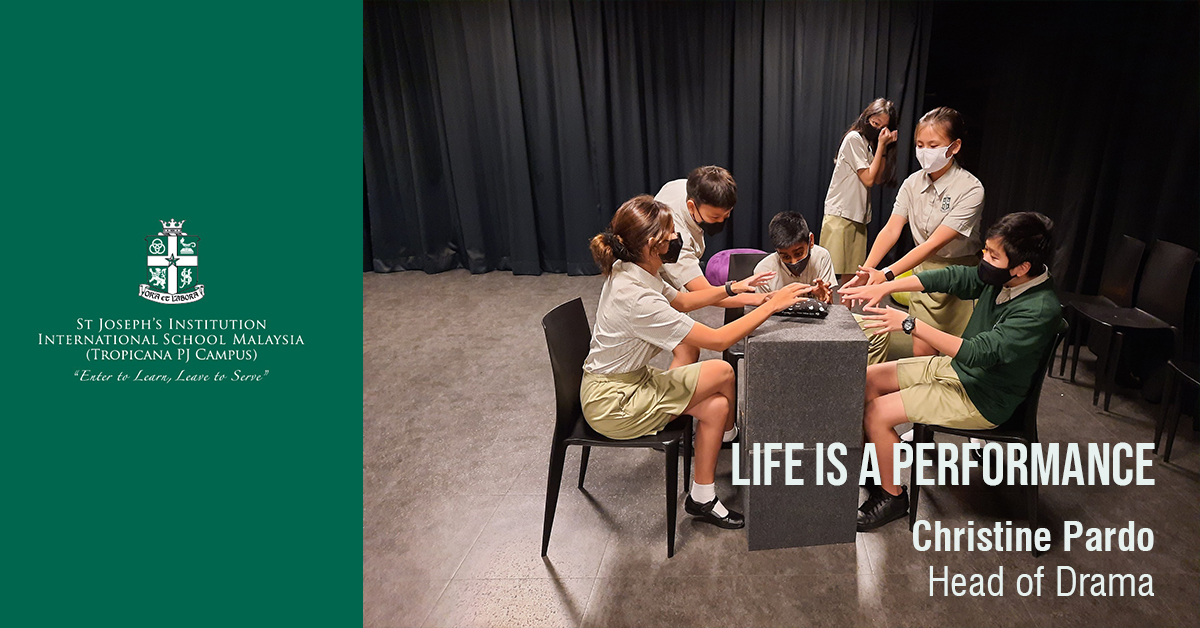Whatever path our students choose in life, they will need to communicate effectively; they will need to collaborate with others and they will need to present themselves and their ideas confidently. In short, they will need to perform.
As a Drama teacher I, of course, love to see students performing, whether during class lessons in the Drama studio, or in more public arenas such as school productions. However, I do not expect all of our students to become Hollywood movie stars or West End theatre performers (although it would be lovely if some did!) What I do hope is that all of our students go out into the world as confident young people, able to communicate successfully in any situation they may find themselves. Interviews for universities and jobs; delivering presentations to tutors or employers; representing a client, negotiating a deal or explaining a medical procedure to a patient – all of these require the ability to communicate. And that is where Drama comes in.
Students at SJIIM are incredibly fortunate in that all year groups from Nursery to Year 9 receive specialist Drama lessons. The skills learned through studying Drama are extensive and varied; reading and reciting scripts increases verbal and literacy skills and, when performing in front of their peers or an audience, students are developing self-confidence and bravery. When a student is cast in a lead role, they’re learning how to accept their achievements with grace and to deal with the pressure of responsibility; when they don’t get the part they want, they’re learning to deal with disappointment. When learning dance and stage movements, students are practising gross and fine motor skills and hand/eye coordination. When a student is cast in a show with people they don’t know, they’re learning how to work with others and cultivate new relationships. When students are rehearsing lines in time for a performance they are learning about time management. When something goes wrong during a performance, students learn how to deal with the unexpected; how to stay calm, be flexible, and demonstrate determination and grit – because the show, as in life, must go on!
In the Elementary School, Drama lessons are practical, engaging and fun. Because Drama involves students using not only their voices and bodies but also their emotions and imagination, it engenders self-esteem and creative thinking. Confidence is built as students as young as three participate in role-playing scenarios, portraying a range of characters and emotions. Drama is also a subject that requires a great deal of peer trust, and so it plays an important role in teaching listening and empathy skills.
In the High School, Drama lessons continue to be engaging and fun, but here there is also a theory element introduced. Students learn about different Drama genres and practitioners and the impact they have had on not only dramatic performances but also society. As the visionary Drama practitioner Augusto Boal said; “Theatre is a form of knowledge; it should and can also be a means of transforming society. Theatre can help us build our future, rather than just waiting for it.”
There is often a feeling that people generally fall into one of two camps – they are either “creative” or “analytical”. Creative people will choose subjects or pastimes such as theatre, music and art. Analytical people will lean more towards science, maths and technology. However, according to a study conducted by Michigan State University, Nobel Prize winning scientists are almost three times more likely than the average scientist to have an artistic hobby. A scientist was regarded as having an artistic hobby if they described themselves – or were described by biographers – as being a painter, photographer, actor, performer, composer, poet, dancer etc.; or if there was direct evidence of artwork, photographs, sculptures, compositions, poems, performances and so on.
The study suggests that science and the arts are not mutually exclusive; that in fact the consistent development of an artistic hobby actually helps to nurture the primary undertaking of being a scientist. Art and creativity is not a “separate venture,” but a way to cross-train. The article goes on to quote Santiago Ramón y Cajal, the Spanish neuroscientist; “To him who observes [scientists with artistic hobbies] from afar, it appears as though they are scattering and dissipating their energies, while in reality, they are channeling and strengthening them.”
It appears that students who might perceive themselves as “analytical” would perhaps benefit from pursuing subjects like Drama, or joining school productions, as this will help them improve in other areas too. Contrary to the feeling that this may be “taking time away” from more academic pursuits, being involved in creative activities can actually enhance achievements in other areas.
From developing communication and confidence, deepening an awareness of self and others, improving literacy skills, strengthening verbal and physical skills, providing safe opportunities to experience success or failure and therefore developing a sense of determination – all while helping to improve achievement in other curricular areas – Drama provides it all.
And if life is indeed a performance, then the students at SJIIM will certainly be ready to take the stage.
Christine Pardo
Head of Drama






